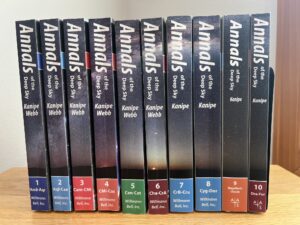
Why “Annals” Appears Everywhere in ChatGPT Writing and Why You Should Care
You may have noticed the word “annals” frequently appearing in articles generated by ChatGPT. It’s one of those words that seems to pop up everywhere, almost as if it’s a favorite term of the AI. But why is it so common, and are there better alternatives that might make for more engaging reading? We’ll explore […]
Read More
Why “furthermore” is Overused by ChatGPT and How to Make Your Writing More Engaging
In natural language processing, few words appear as often as “furthermore.” This word has become a staple in texts generated by AI models like ChatGPT. While “furthermore” is functional, its frequent use can make writing sound repetitive and overly formal. Understanding why “furthermore” is so common in AI-generated text and exploring simpler alternatives can make […]
Read More
Why ChatGPT Overuses the Word ‘enchanting’ and How to Diversify Your Vocabulary
You might have noticed that the word “enchanting” appears quite often in texts generated by ChatGPT. It’s one of those terms the AI seems to favor, perhaps more than necessary. In this article, we will explore why “enchanting” is so commonly used and suggest simpler and easier-to-understand alternatives you can use in your writing. Whether […]
Read More
Why You Keep Seeing ‘moreover’ in ChatGPT Responses
Have you ever noticed certain words popping up more often than others? One such word is “moreover.” Interestingly, ChatGPT uses it among the most overused words. While “moreover” effectively serves its purpose, understanding why it’s frequently used and exploring its alternatives can keep your writing fresh and engaging. This article explores the reasons behind the […]
Read More
Why ‘trivial’ is One of ChatGPT’s Most Overused Words
The word ‘trivial’ is one of ChatGPT’s most overused terms. You might wonder why this seemingly simple word appears so frequently in the responses you receive. In this article, we will explore why ‘trivial’ is commonly used, introduce you to some alternatives, and explain why varying your vocabulary can make your communication clear and engaging. […]
Read More
Why ChatGPT Overuses the Phrase ‘at the heart of’ and How You Can Communicate More Clearly
You’ve likely encountered the phrase “at the heart of” countless times in articles, speeches, and even casual conversations. It’s one of the most frequently used expressions by AI language models like ChatGPT, often serving as a go-to for emphasizing the core of a subject. Understanding its common use is critical for clearer and more engaging […]
Read More
Why ChatGPT Keeps Using the Word ‘bespoke’ and What It Really Means
You’ve probably noticed the term “bespoke” popping up frequently in ChatGPT’s writing. It’s one of those words that seems to find its way into various contexts, sometimes to the point of overuse. While “bespoke” certainly adds a touch of sophistication, its constant use can come across as overly formal or even pretentious. In this article, […]
Read More
Why Does ChatGPT Often Use the Word ‘additionally’ and What are the Alternatives?
Did you know that “additionally” is one of ChatGPT’s go-to words? While it’s great for signaling more info is on the way, using it too much can make conversations feel mundane and stiff. In this article, we’ll dive into why this word is so frequently used and offer some fresher, more relatable substitutes that can […]
Read More
Why Does ChatGPT Use the Word ‘unlock’ So Frequently
In digital communication and artificial intelligence, some words weave their way into conversations more than others. Among these, “unlock” stands out, frequently appearing in ChatGPT interactions. This article explores why “unlock” is so commonly used in AI-generated content and offers accessible alternatives to make your communication more engaging and easier to understand. By learning why […]
Read More